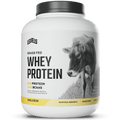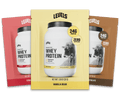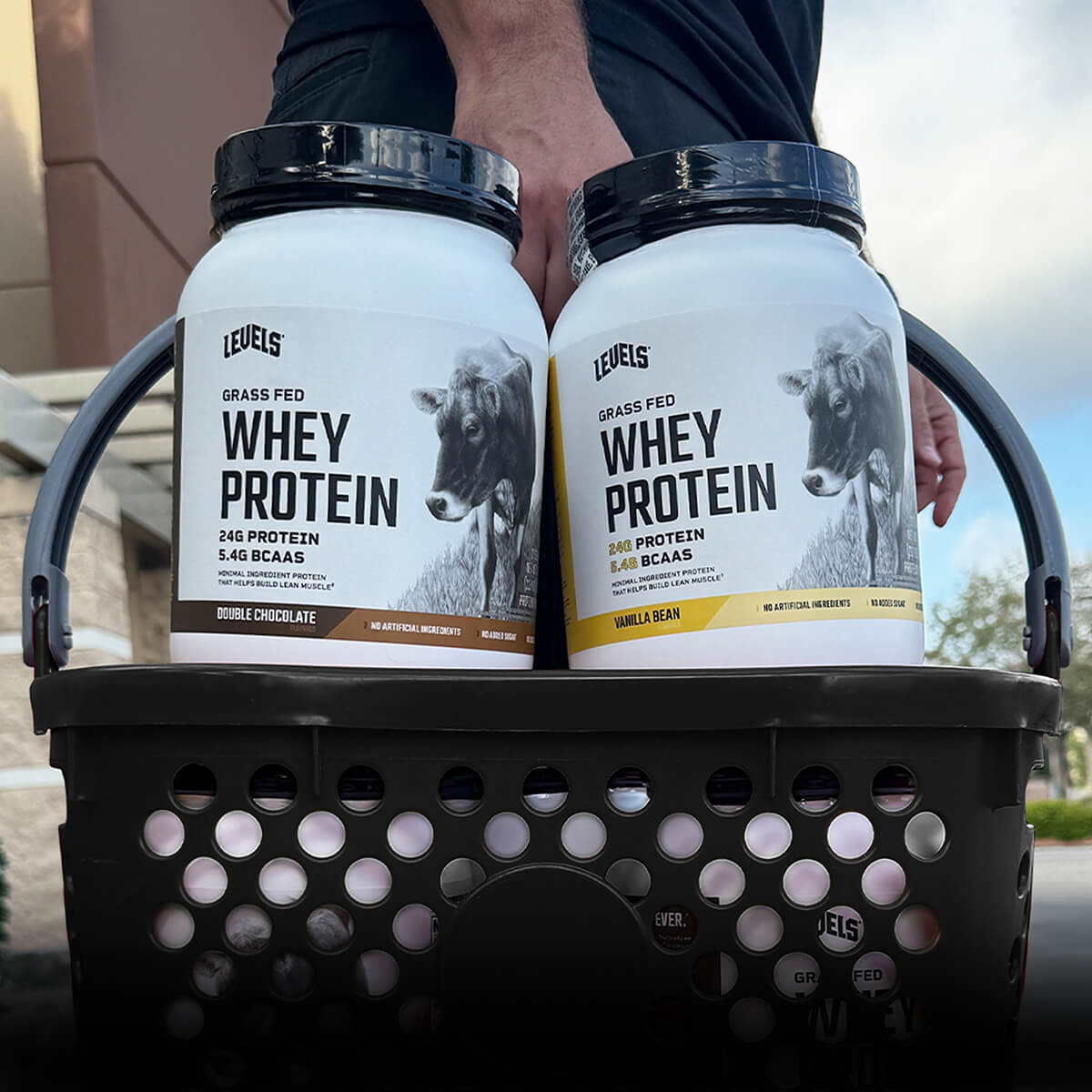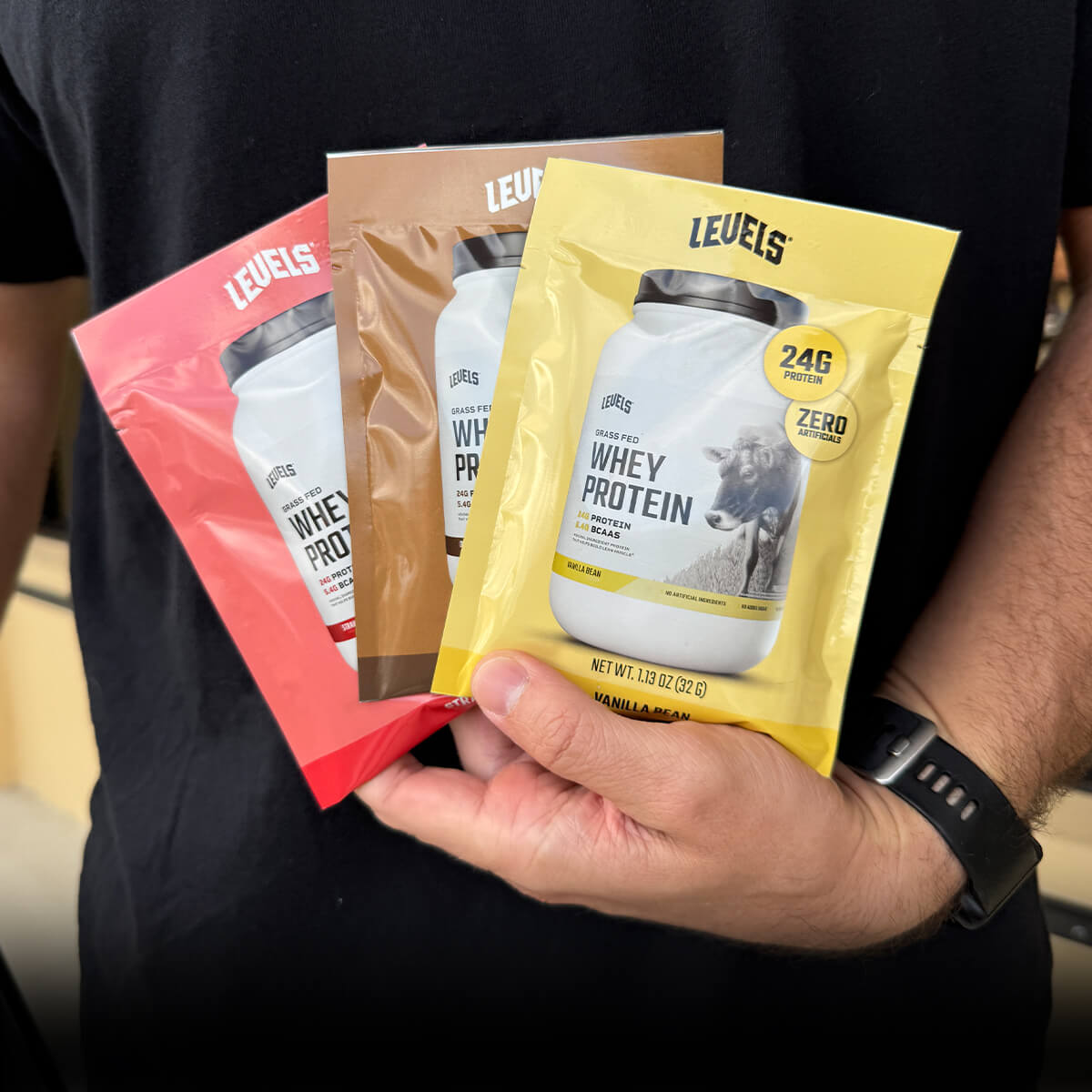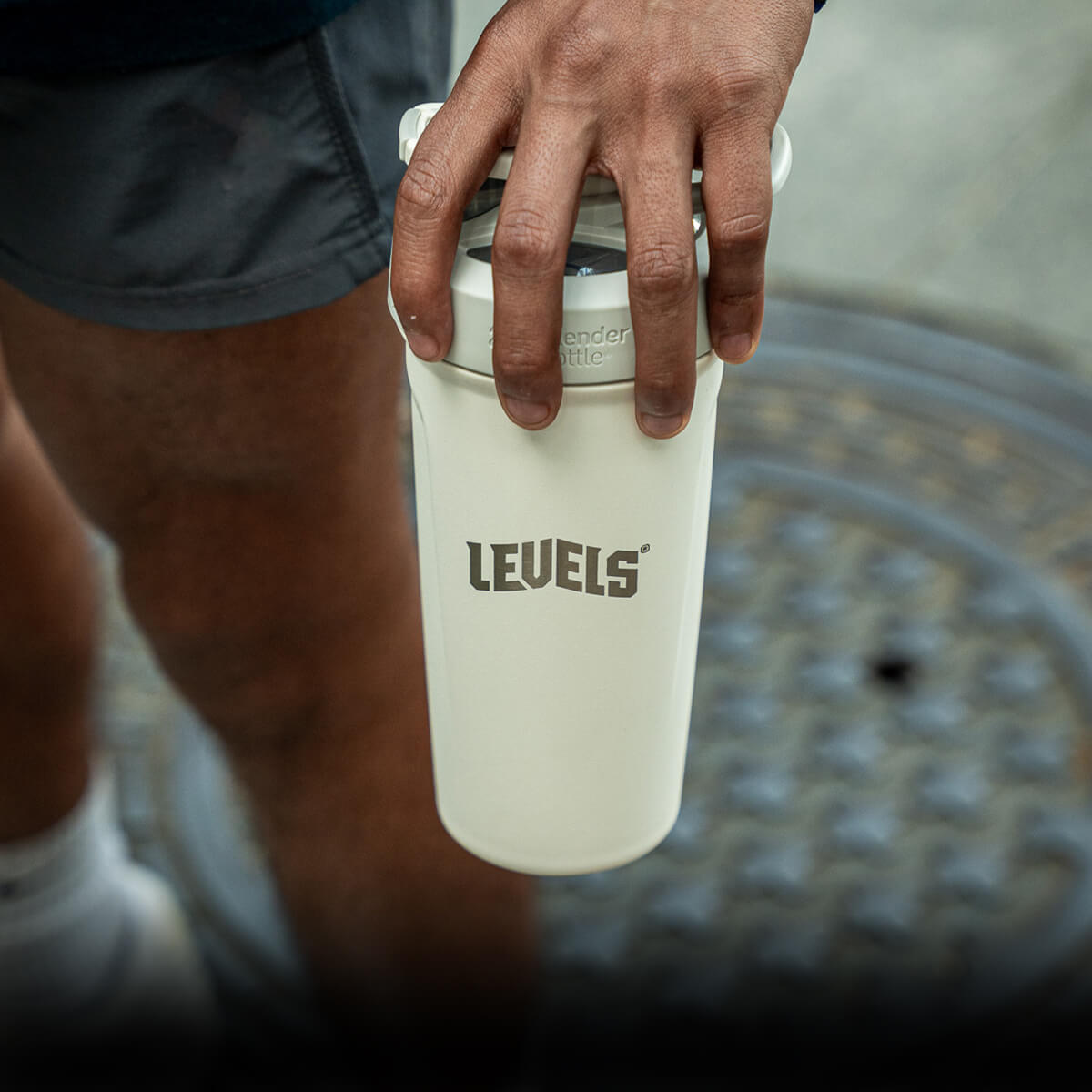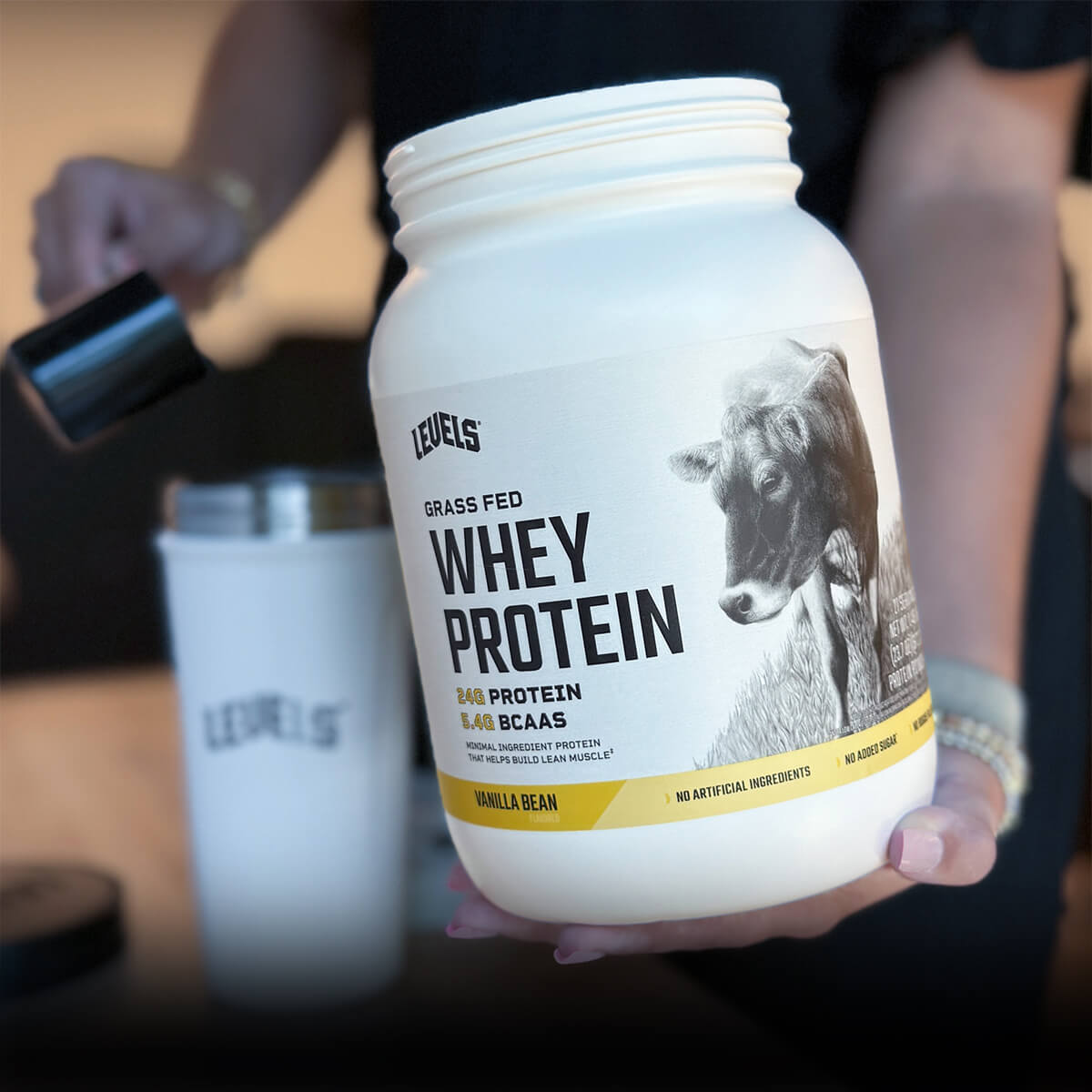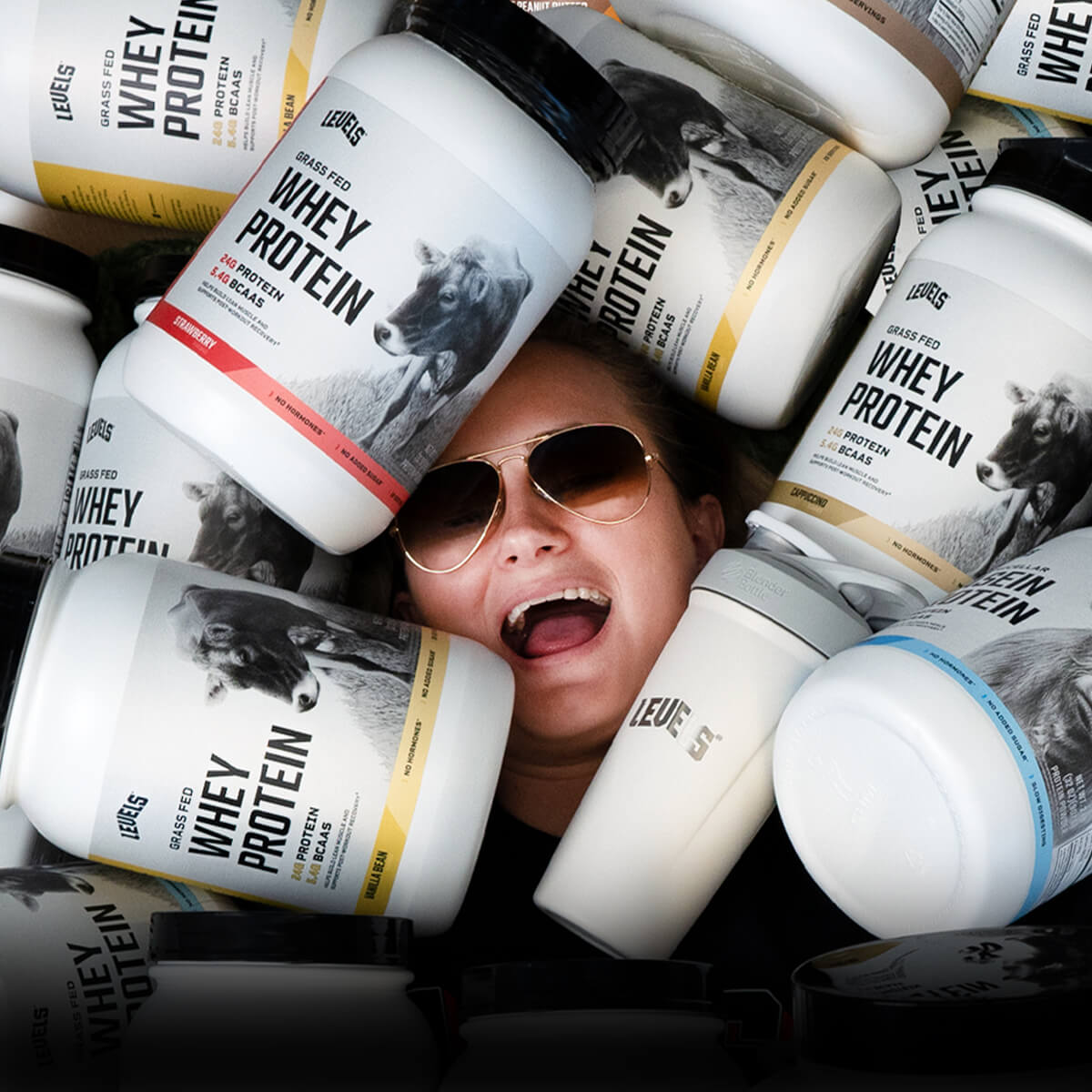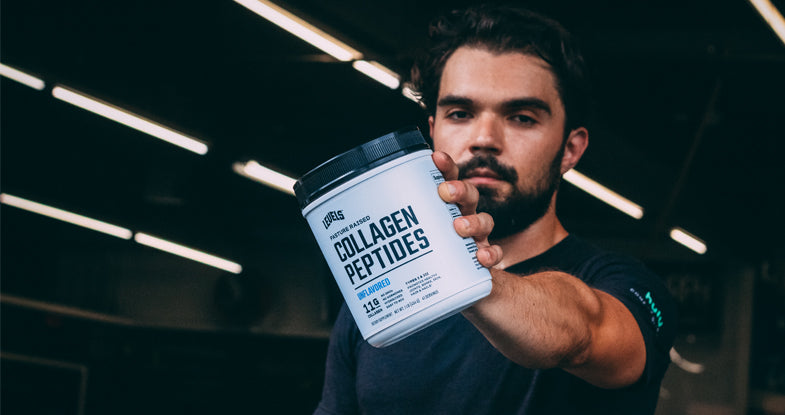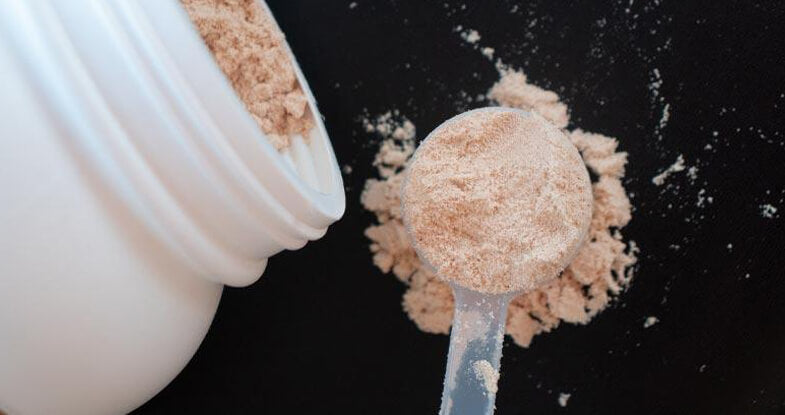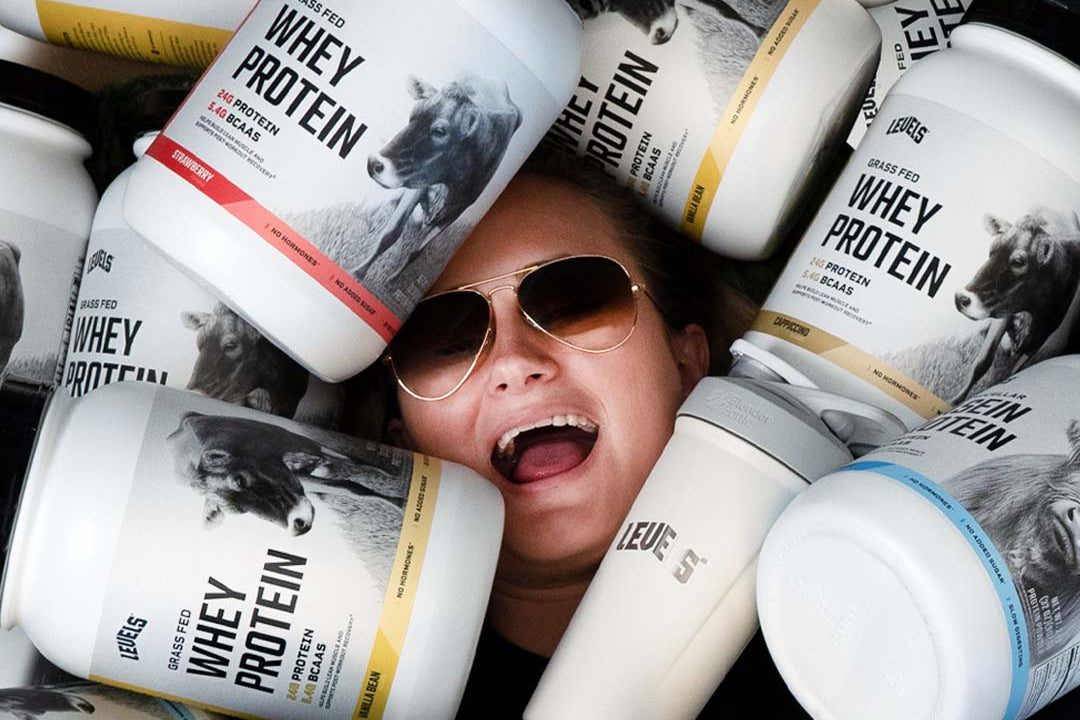Collagen protein is a top pick for injury rehab, pain relief, and healthier aging. But how do the benefits of collagen protein compare to gelatin?
In this article, we’ll discuss the differences between collagen and gelatin, the benefits of each, and how to get more of both in your diet.
What Is Collagen and What Is Gelatin?
What is Collagen?
Collagen is a special type of protein high in the amino acids glycine, proline, hydroxyproline, alanine, and arginine. In fact, compared to other proteins, it has 10-20 times more glycine and proline[*].
Of all the protein in your body, 30-40% is collagen[*]. That’s because it’s a key component of your skin, tendons, ligaments, and other tissues.
Collagen in your body is extremely tough thanks to its unusual, elongated structure[*]. Without collagen, your body wouldn’t hold its shape.
Foods like meat, fish, and bone broth are natural dietary sources of collagen. And most collagen supplements you can buy come from cows, pigs, marine sources, and chickens[*].
Normally, your body makes its own collagen using amino acids from the protein you eat, not necessarily from the collagen contained in food sources.
However, research proves eating collagen boosts your body’s natural collagen production[*].
That’s why collagen protein supplements have gotten popular recently among health, fitness, and beauty enthusiasts.
Names for these supplements include collagen hydrolysate, collagen peptides, hydrolyzed collagen, and collagen protein powder.
Manufacturers make collagen supplements using a process called hydrolysis, typically in combination with other techniques like filtration and spray-drying.
The goal of these specialized manufacturing techniques is to produce a supplement that mixes easily with cold water and digests rapidly.
What is Gelatin?
Gelatin refers to natural collagen that has been heated and processed for cooking, commercial food production, or industrial use. Unless you’re a vegetarian or vegan, you’ve probably eaten gelatin without even realizing it.
As with collagen, gelatin mostly comes from cows, pigs, marine sources, and chickens[*].
Although gelatin is hydrolyzed (broken down into smaller clusters of amino acids called peptides) during manufacturing similar to collagen protein powder, the rest of the process varies and depends on the intended use for the gelatin.
You can buy gelatin for cooking in the form of powders, granules, and clear sheets.

It’s an essential ingredient in many desserts, most gummy candies, marshmallows, ice cream, and yogurt products[*].
Gelatin also has hundreds of different uses in the pharmaceutical, medical, and cosmetic industries.
3 Differences Between Collagen and Gelatin
1. Processing
The manufacturing process of collagen and gelatin affects the structure of peptides, which are tiny segments of protein found in both.
Gelatin has been around since at least the Middle Ages[*]. As you might imagine, manufacturing practices have evolved quite a bit since then.
Collagen peptides are a more recent invention, optimized for drinking with water or other liquids instead of cooking.
The molecular weight, arrangement, and peptide length all vary according to how collagen and gelatin are produced[*]. In turn, these factors affect the nutritional and digestive qualities of the products.
There are dozens or hundreds of ways to make gelatin, and they don’t all result in ideal properties for supplementation. In fact, plenty of gelatin isn’t even intended for human consumption.
2. Solubility and Ease of Mixing
If you try using gelatin in place of a high-quality hydrolyzed collagen supplement, the first difference you may notice is difficulty dissolving the gelatin.
Cooking gelatins require heating or soaking to mix properly. And due to its high molecular weight, most gelatin will form a gel in water rather than dissolve[*].
On the other hand, the properties of collagen peptides are perfect for mixing and drinking on the go.
3. Digestibility and Absorption
A 2019 study from the journal Nutrients compared the digestion of collagen protein with shorter peptides to a collagen protein with longer peptides[*].
The researchers found that the short peptides absorbed faster (20 minutes vs. 40 minutes) and showed significantly higher absorption and bioavailability (amount circulating in the bloodstream after ingestion).
Although the study compared two different types of collagen protein powder, we can deduce that gelatin (with its longer peptides) would absorb even more slowly, and would likely result in lower absorption than collagen protein powder.
Because of these differences, it’s also possible gelatin might be harder on your stomach than collagen supplements, but there’s not enough data to say for sure.
8 Benefits of Collagen and Gelatin
As you learn what collagen supplements can do for your health and fitness, here’s something to keep in mind.
Studies use collagen peptides rather than gelatin, so there aren’t studies proving the benefits of taking gelatin.
However, if you only have access to gelatin and can’t buy collagen peptides where you live, it’s a safe bet that gelatin could have similar effects--if you don’t mind the unappealing texture and slower, lower absorption.
1. Joint and Bone Health
Collagen, particularly hydrolyzed collagen, has outstanding benefits for joint and bone health.
A 24-week study on Penn State University athletes with activity-related joint pain found that 10 grams of daily collagen peptides significantly improved their pain levels at rest and during a series of movement tests[*].
Other research shows that taking hydrolyzed collagen enhances the production of other compounds found in connective tissue, not just collagen[*].
Studies suggest hydrolyzed collagen can also stimulate bone-forming cells, improve calcium absorption, and protect bone density through anti-inflammatory and antioxidant pathways[*].
As a result, some scientists think taking collagen may promote healthy bone formation in young people and reduce the risk of osteoporosis later in life[*][*].
2. Skin Appearance and Moisturization
Collagen peptides can improve skin appearance, reduce wrinkles, and hydrate your skin from the inside out. At least, that’s what several peer-reviewed studies have found.
For example, two separate studies found that 10 grams a day of collagen offered significant, lasting benefits to skin[*]. After 4 weeks the supplementation increased dermal collagen density, and 8 weeks of use improved skin hydration. The benefits persisted 12 weeks later.
Other studies show better skin elasticity, fewer visible wrinkles, less rough skin, increased collagen production, and reversal of sun damage[*][*][*].
Lastly, just 2.5 grams per day of collagen peptides can improve the appearance of cellulite (and other skin health markers), according to a trial of 105 women between the ages of 24-50[*].
3. Exercise Recovery
When it comes to promoting exercise recovery, whey protein is a top pick.
However, there could be a good case for using collagen protein powder as part of your recovery strategy, too.
A study of 24 active men performing isometric and plyometric exercises found 20 grams a day of collagen protein decreased their soreness and improved their performance compared to control[*].
This study doesn’t fully answer the question of whether collagen protein offers additional recovery benefits when combined with whey or other complete proteins, but we do know that it can reduce joint pain in hard-training athletes.
Therefore, if you train hard, there’s a good chance that collagen could benefit you by accelerating your healing and possibly preventing injuries.
4. Pain and Arthritis
If you have joint pain or osteoarthritis, taking collagen might be a good idea--even if you don’t work out.
One study of 200 people over age 50 found that 12 grams of collagen hydrolysate per day for six months improved back pain[*].
A 2019 meta-analysis of five high-quality oral collagen peptide studies found they decrease osteoarthritis pain according to two different measures[*].
Additionally, glycine (a major component of collagen protein) also appears to increase collagen synthesis (your body’s production of collagen), which could help relieve osteoarthritis[*].
5. Gut Health
There’s some evidence collagen and gelatin may benefit your gut health, but it’s too early to say for sure.
For example, a cell study found that collagen can repair damage to cells that make up the lining of your intestines[*]
6. Nails
In a 2017 trial, female participants with brittle nails took 2.5 grams per day of collagen peptides daily for 6 months[*].
Here’s what researchers found:
- Nail growth went up 12%
- Subjects broke nails 42% less often
- 80% of participants were satisfied with the treatment and felt their nail appearance improved
If you have brittle nails, collagen is definitely worth a try.
7. Appetite Reduction and Possible Weight Loss
Food cravings or an out-of-control appetite can make weight loss difficult.
The findings aren’t definitive, but there's a reason to think collagen protein powder might assist you in conquering cravings.
One trial showed that a 20-gram dose of hydrolyzed collagen can increase glucagon-like peptide-1 (GLP-1) levels in lean and obese people alike[*].
Evidence suggests GLP-1 can decrease appetite and reduce weight in overweight people[*]. That means taking collagen might help curb your appetite and assist you in shedding unwanted weight.
8. Sleep
Glycine, one of the principal amino acids of collagen, may help promote restful sleep.
Studies suggest taking 3 grams of glycine before bed can[*][*]:
- Improve self-rated sleep quality
- Reduce time to get to sleep
- Lessen daytime sleepiness
- Improve next-day memory performance
- Decreased fatigue and produce other subjective improvements
Collagen hydrolysate from cows is about 25% glycine by weight[*]. Therefore, a 10 gram dose of collagen (which we recommend here at Levels as a starting dose) provides a similar amount of glycine shown in studies to improve sleep quality.
Subscribe to get the latest advice, sales, discounts, product drops and more. Join now and get 15% off your first order.
How to Get More Collagen and Gelatin in Your Diet
While you could mix up a batch of cooking gelatin, we don’t recommend it. Possible digestive issues aside, drinking a thick gel isn’t very appealing for most people.
There are two good ways to get more collagen or gelatin in your diet: whole foods and supplements.
Whole Foods for Extra Collagen
Here’s what to eat for extra collagen:
- Sinewy cuts of meat
- Fish, pork, or chicken with the skin on
- Organ meats
- “Odds and ends” (pigs’ feet, for example)
- Team favorite: Collagen Chia Pudding
Bone broth is another way to get extra collagen.

However, it’s not only time-consuming (24-48 hours to make at home), it also may not compare favorably to collagen protein supplements, according to a 2019 study[*].
The study, which compared various bone broth recipes to a 20 gram dose of collagen peptides, found inconsistent levels of amino acids between recipes and overall lower levels compared to supplements.
Bottom line: bone broth is tasty and nutritious, but it’s not the best way to get extra collagen.
Unfortunately, there are no vegetarian or vegan whole foods or supplements that contain collagen.
Some successful experiments have used genetically-modified yeast and bacteria to produce human collagen, which is technically vegan[*]. Help yourself, but we’ll pass.
If you don’t eat animal products, your best bet for supporting collagen production is to consume plenty of protein. That way, you’ll hopefully get enough amino acids to support collagen synthesis.
That brings us to supplements.
Collagen Supplements
Most studies of collagen’s effects use 2.5 to 15 grams of collagen peptides daily for 3-18 months, but a few use as much as 20 grams per dose, once per day[*].
We recommend 10 grams per day of our collagen peptides to begin with. If you want to try a higher dose, try doubling the dose or taking several doses of 10 grams each day.
What about a maximum dose?
There are no serious adverse effects to taking collagen. Rarely, some people experience an upset stomach or other GI issues. These may clear up on their own, or you can lower your dose.
Although collagen is not a complete protein, the only essential amino acid it lacks is tryptophan.
That means you could consume collagen for as much as 36% of your overall protein needs without developing an amino acid imbalance[*].
In other words, if you consume 150 grams of protein per day, getting up to 54 grams of collagen protein is perfectly fine according to research.
Here’s some food for thought as far as choosing collagen supplements.
At Levels, we think grass-fed or wild-caught sources are better for your health. They’re usually better for the environment, too.
Make sure the supplement you choose doesn’t have unnecessary fillers. The protein content should be around 90% of the serving size by weight (for example, an 11-gram scoop with 10 grams of protein).
And finally, different collagen sources can have different biological effects[*]. We stuck with grass-fed bovine collagen in our product because we noticed cow collagen was backed by most studies.
Conclusion
Here’s a quick summary of what we’ve learned about collagen vs. gelatin:
- Collagen protein supplements and cooking gelatin come from the same sources and have the same amino acids
- Because the peptide length and molecular weight are different, the properties of collagen protein powder and gelatin vary
- Collagen supplements are better than gelatin for ease of mixing, digestibility, absorption, and bioavailability
- Collagen peptides mix with water, while cooking gelatin forms a gel
- 10-20 grams per day of collagen can benefit your joints, bones, pain, nails, sleep, and possibly gut health, weight loss, and skin health
- Whole foods with collagen are healthy too, but collagen supplements are the best way to experience the benefits of collagen
- Bonus fact: along with collagen protein supplements, eating a diet high in ascorbic acid (vitamin C) is another way to support collagen synthesis[*]
Have you tried collagen peptides yet? What benefits have you noticed? Let us know in the comments!
